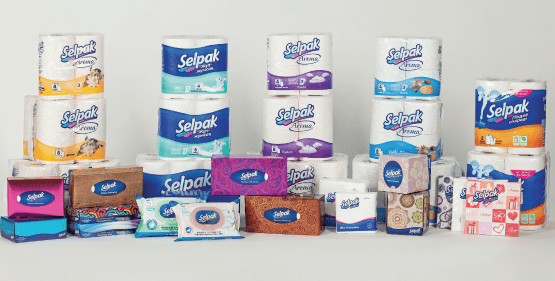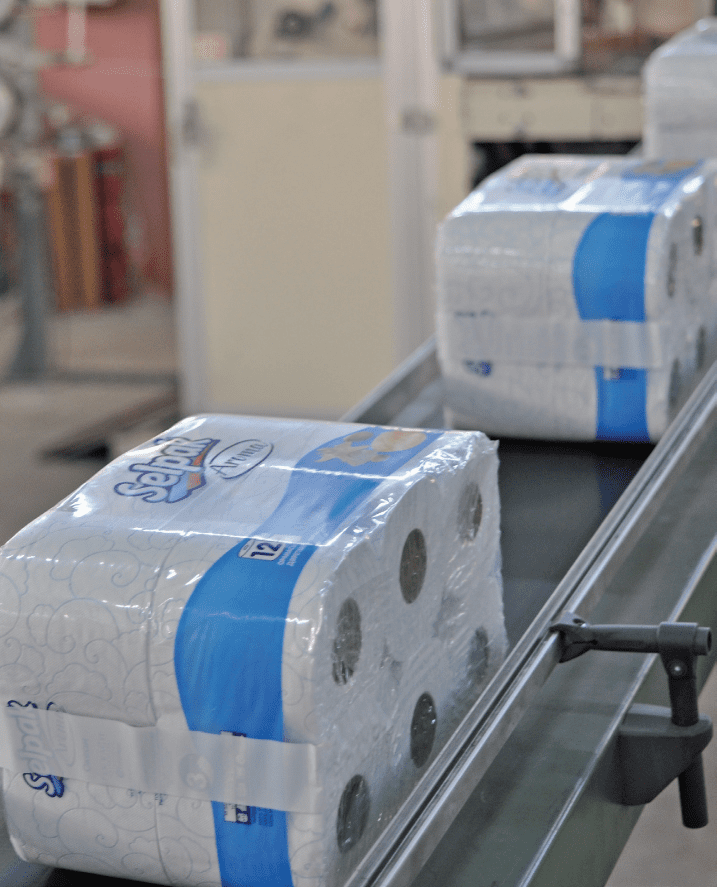By Helen Morris, TWM editor
The Turkish tissue manufacturer went the extra miles to take advantage of a vast geographical region of economic and social potential. Here, TWM interviews Hamdi Yazıcı, Central Asia operations director, to get the latest.
İpek Kağıt Kazakhstan is a fully owned subsidiary of İpek Kağıt and was established in 2006 to assist the Turkish tissue manufacturer İpek Kağıt in the expansion of its exports of branded products in the region.
İpek Kağıt has initiated a geographical expansion project across Central Asia by establishing a converting plant in Kazakhstan, the fastest developing country in the region. Hamdi Yazıcı, İpek Kağıt operations director, Central Asia, says the company’s Kazakhstan plant is the most modern manufacturing facility in the country and surrounding region.
The site produces bathroom tissue, kitchen towels, napkins and facial tissue under the Selpak, Solo, Silen, Servis, and Marathon brands. Its aim is to be the leader in the Kazakh market and the company aims to also take the lead in the regional tissue paper market through exports to Kyrgyzstan, Uzbekistan, Tajikistan and other neighbouring countries.
TWM1: What is your presence in Kazakhstan? Why did İpek Kağıt decide to establish a site there?
Hamdi Yazıcı: “In line with our vision of expanding İpek Kağıt’s geographic reach, we analysed the markets in Central Asia to determine which one offered the most economic and social potential for establishing a presence in the region. We decided that the most suitable market for our first investment was Kazakhstan, despite it being the farthest away from Turkey, so in 2006, we established İpek Kağıt Kazakhstan.
“Our plant in Kazakhstan, by far the most advanced production facility of its kind in Kazakhstan and the region, converts parent rolls produced at our mills in Turkey into a wide range of high quality tissue paper products.
“According to Nielsen, which measures retail sales in Kazakhstan, our Selpak brand is the leader in the premium segment of bathroom tissue and kitchen towel categories.”

Yazıcı: “İpek Kağıt Kazakhstan is present in the consumer tissue paper market with its Selpak, Silen, and Servis brands, and in the AfH market with Selpak Professional and Marathon brands, offering high quality bathroom tissue, kitchen towels, napkins and facial tissue.
“Kazakhstan’s retail channel is developing rapidly and the number of its chain stores increasing steadily. Accordingly, we plan to produce private label tissue products in the period ahead that would fit our strategy.
“Our converting plant in Kazakhstan has an annual capacity of 10,000 tonnes. We are in the process of constructing a new plant in Astana that will come on stream at the start of 2016 where we will add new converting equipment to double our production capacity.”
“Kazakhstan’s retail channel is developing rapidly. We plan to produce private label tissue products in the period ahead that would fit our strategy.”
Hamdi Yazıcı, İpek Kağıt operations director, Central Asia
TWM3: Do you have plans to invest in new technology?
Yazıcı: “In line with our mission to offer consumers high quality, innovative products, we continually invest in new technology. In this regard, we have plans for new investments in the bathroom tissue and kitchen towel categories. We are developing new products and technologies with İpek Kağıt’s R&D Centre in Turkey.”

TWM4: What trends are you seeing in the Kazakhstan tissue market?
Yazıcı: “Kazakhstan achieved double-digit economic growth until 2007, then single-digit growth thereafter, in parallel with global economic developments. Growth rates in the tissue paper market reflected this overall trend.
“International tourism is not very developed in Kazakhstan, so growth in AfH sales is mainly driven by rising household prosperity, hence, more time spent out of the home and increased domestic tourism.
“In the retail channel, we expect the growth of chain stores to spur demand for private label in the years ahead.”

TWM5: What opportunities do you see for İpek Kağıt in Kazakhstan and surrounding areas? How much will you increase you exported products?
Yazıcı: “In line with its goal of becoming the leader of the Central Asia’s tissue paper market, İpek Kağıt Kazakhstan is an active player in the region, with exports to Kyrgyzstan, Tajikistan, and other neighbouring countries.
“With the start of customs union between Kazakhstan and Russia, Russia has also become a target market for İpek Kağıt Kazahstan. For this reason, we have located our new plant in the strategic region of Astana and are expanding and modernizing our production capacity.”
TWM6: How is the tissue market in Kyrgyzstan, Uzbekistan, Tajikistan and Turkmenistan? What opportunities are you seeing there?
Yazıcı: “Kyrgyzstan and Tajikistan have smaller populations and per-capita income levels than Kazakhstan. Although İpek Kağıt is exporting to these countries, their share of our overall sales in the region is still very low.
“Uzbekistan has a population of close to 30 million, making it one of the most populous in the region in addition to having higher per-capita income than neighbouring countries.
“While it is quite difficult to export to Uzbekistan due to its closed economy, the country will have one of the highest growth potentials in the region when it opens its economy to international trade.”
“The opening of new chain stores and entry of international players means chain stores are steadily increasing their share of the retail market at the expense of open markets and corner stores.”
TWM7: What are the main challenges and opportunities you see in the Kazakhstan tissue market?
Yazıcı: “As much as 60% of Kazakhstan’s bathroom tissue market comprises single roll, paper-wrapped, low quality products. Because consumers are used to using these products, it takes time for them to become familiarised with and accustomed to using higher quality bathroom tissue.
“However, the opening of new chain stores and entry of international players in Kazakhstan’s retail sector means that chain stores are steadily increasing their share of the retail market at the expense of open markets and corner stores. This development creates more opportunities for introducing new and higher quality products to consumers in the country.”

































